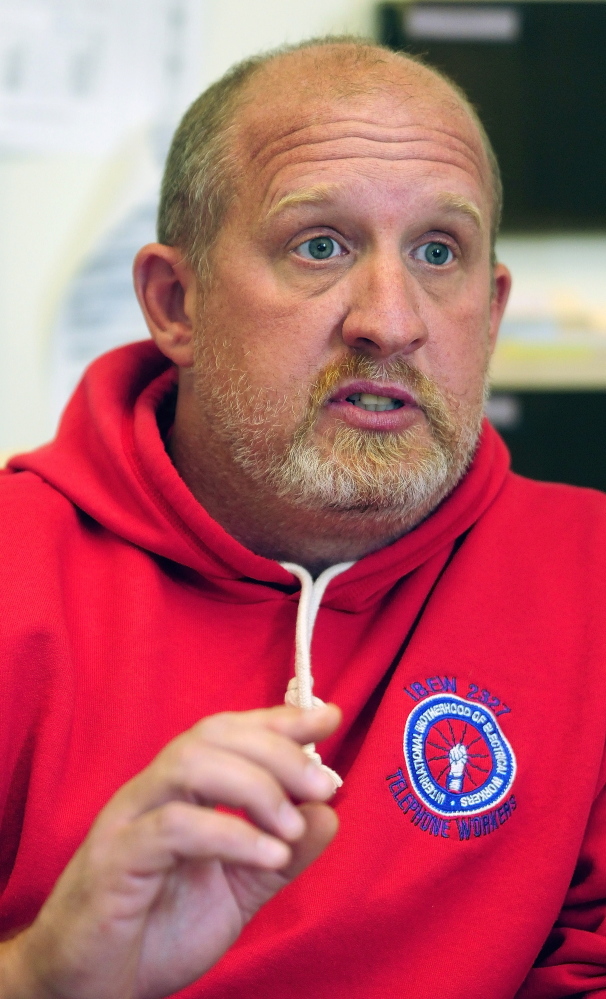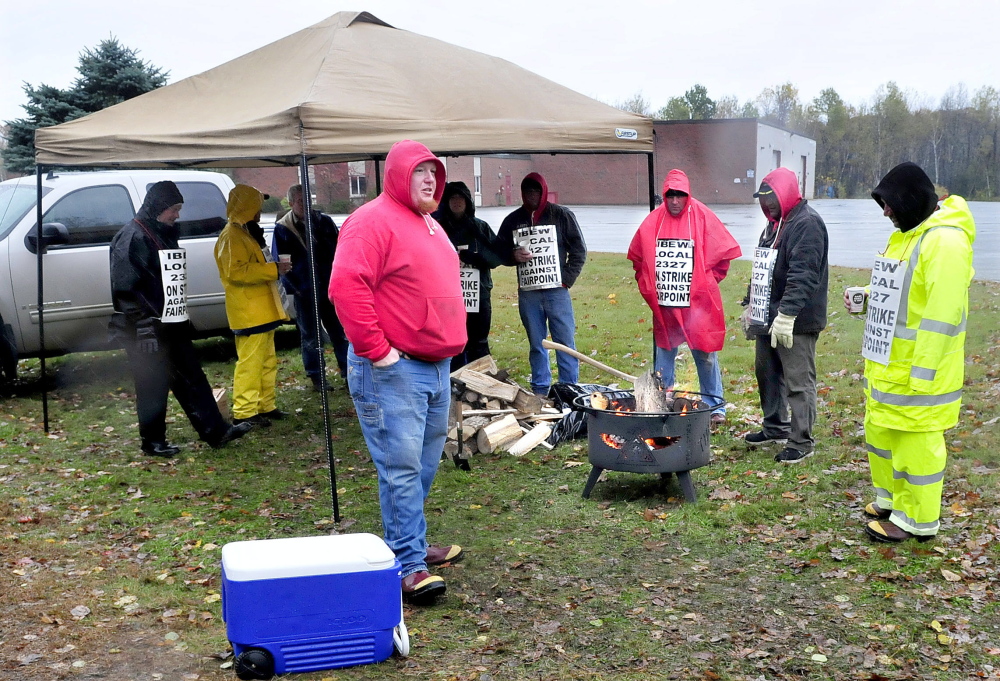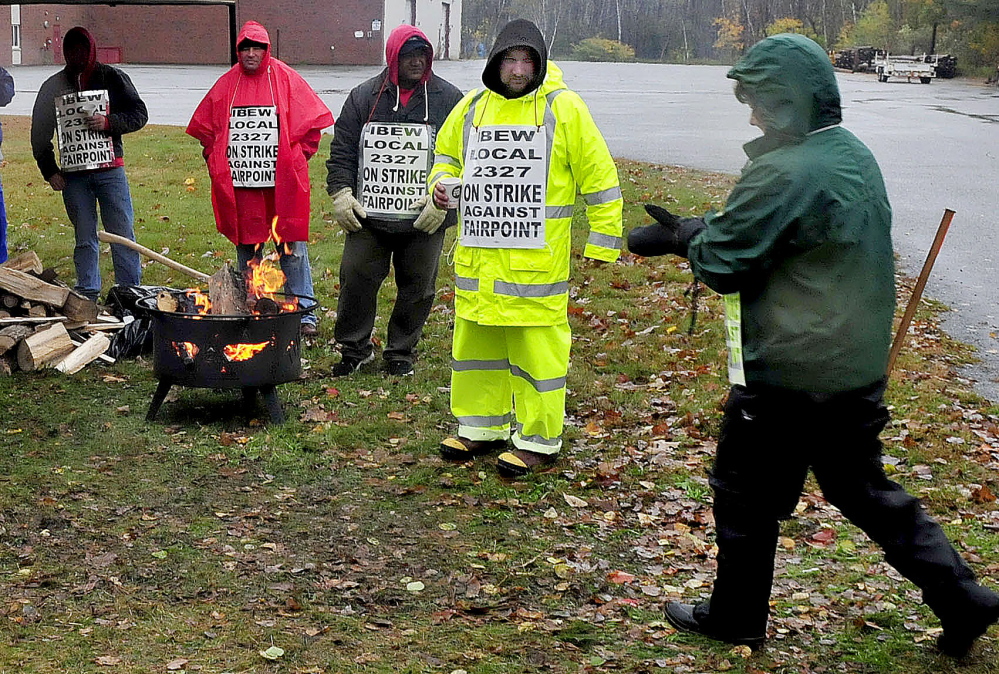About 800 striking FairPoint employees in Maine on Thursday received the last paycheck they will get until the labor dispute is settled, but union members promise to stand strong against what they see as an unfair contract.
“It’s definitely challenging for the membership, but we know what we’re here fighting for and we know how important it is,” said Peter Keefe, a 17-year employee with the company who was at the union hall in Augusta on Thursday.
Keefe is treasurer and shop steward for International Brotherhood of Electrical Workers Local 2327. IBEW represents about 1,700 workers while Communications Workers of America represents nearly 300. “Spirits are excellent out on the line,” he said. “Even in the pouring rain spirits are very high.”
More than 1,900 unionized FairPoint employees in Maine, New Hampshire and Vermont on Friday will begin their second week of a strike spawned by the company’s demand for $700 million in contract concessions.
In Waterville, strikers huddled Thursday around a fire of donated wood, unwilling to let the wind and rain keep them from staffing the picket line daily from 7 a.m. to 5 p.m.
Todd Foster, an installation and maintenance worker for FairPoint in Waterville who has a 4-week-old child, said it’s up to employees to support themselves during the strike.
“Some of us are going to have to go and find some other work, but we are not going to cross this line,” he said.
Kelly Hoskins, a central office technician based in Waterville, said many of the strikers have young children they must support and medical benefits are an issue.
“Medical benefits are huge if they lose it for their kids,” she said.
Hoskins said the strikers will continue to have health benefits through Oct. 31. After that, she said, the company is required by federal law to offer coverage, but those plans can be expensive, she said.
“It’s absolutely worth it. You have to fight for what’s right, and it isn’t always easy, but that’s how you get ahead,” she said. “All of New England, and I think Maine especially, has a great work ethic, and there’s nobody here who wouldn’t rather be working than doing this.”
Keefe, in Augusta, said the company would maintain profitability if it accepted the union’s proposal. He said much of the company is owned by hedge funds.
“The money they’re trying to cut out of our contracts will go right back to the hedge funds,” Keefe said. “This is a Main Street versus Wall Street fight. It’s not just telecommunications and FairPoint. This is what’s going on in America today.”
The unions, which have accused the company of negotiating in bad faith since talks began in April, have countered with a proposal that would slash $200 million in benefits but would maintain prohibitions against using non-union employees. The company’s proposal includes a provision that would allow it to use outside contractors, and union representatives have said FairPoint would use contractors to eliminate union positions.
Keefe said the union is willing to work with the company, but it will not bow to the demand to fill positions with outside workers when union employees have been trained for those jobs.
“They want to bring in low-paid, low-trained contractors to do the work,” Keefe said. “They want to take good jobs and bring in out-of-state, sometimes out-of-country, contractors to do that work. That’s first and foremost on our list.”
Foster said FairPoint is using those contract crews to do the jobs of the striking workers. He doubted the replacement crews, whom he said are coming from all over the country, are up to the task.
“We’re really worried about the customers with this storm, because we feel that there’s going to be a lot of people out there without service,” Foster said. “And these replacement workers won’t know how to get back in service.”
Earlier this week, the company accused the unions and their members of causing service disruptions by intimidating temporary workers and preventing them from servicing customers. The company also claimed “union sympathizers” were behind a phone-jamming campaign that targeted its customer service call center, clogging phone lines and preventing customers from reaching the company with legitimate service requests.
None of those complaints were in central Maine, where police in Augusta and Waterville said striking workers haven’t caused any problems.
Keefe, 43, has watched the company for which he works change hands four times in the 17 years he has worked there. He was hired to work for NYNEX, which was bought by Bell Atlantic, then Verizon and then, in 2005, FairPoint.
“It’s quite a transition,” Keefe said.
Keefe was among the union members who went on strike for two weeks in 2000. A 1989 strike lasted for 16 weeks. Striking poses challenges for Keefe’s co-workers, some of whom live paycheck to paycheck. IBEW did not have a strike fund, Keefe said. The members last paycheck was issued Thursday. He said union members have known the strike was possible, and they were warned to save up enough to see them through an extended period.
“We knew for five years the exact day our contract expired,” Keefe said. “We all knew it was coming. We’ve done a great job preparing and we’re ready.”
Craig Crosby — 621-5642
Twitter: @CraigCrosby4
Evan Belanger — 861-9239
Twitter: @evanbelanger
Send questions/comments to the editors.





Comments are no longer available on this story